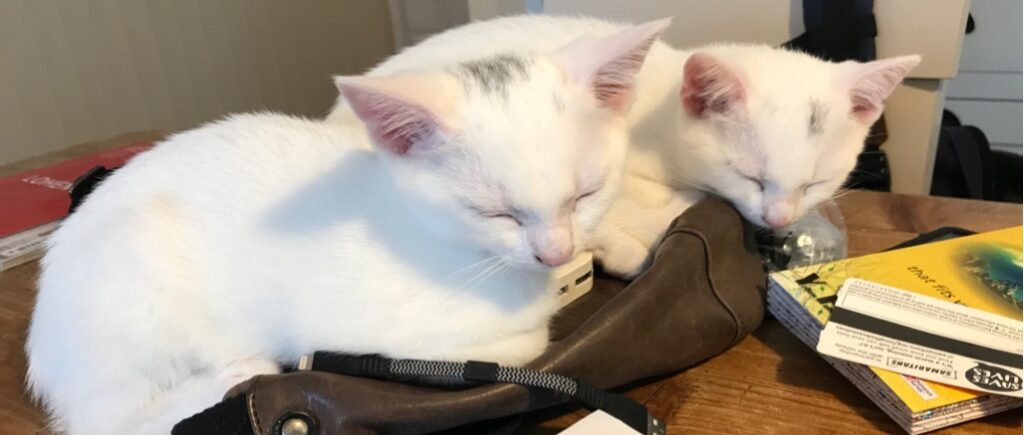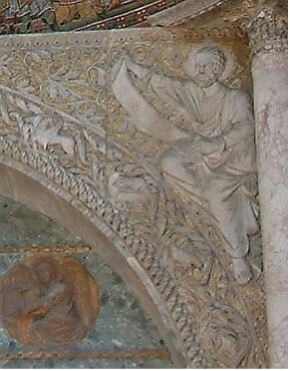Menu

 In architecture a spandrel is the space between an arch and the vertical wall. It had no purpose until artists discovered its value for decoration. In biology is a byproduct of an adaptive selection for another purpose. Both are subtly different from exaptation (search this blog for multiple postings) which is when a trait that evolves for one function exapts for something different under pressure – dinosaur feathers evolved in a linear way for sexual display and/or warmth but exapted for flight. Adaptation can also be appropriation; the header picture shows Lyra and Alys, the latest additions to the Snowden household. Designer beds have been purchased and strategically sited in ideal locations. However their declared preference is for my favourite bag, used for day trips with the iPad but not the MacBook. It is now their property, repurposed and possessed. As a species we are adept at exploring opportunities and repurposing existing capability. We evolved as a species inclined to serendipity, to change discover, to finding things in our peripheral vision.
In architecture a spandrel is the space between an arch and the vertical wall. It had no purpose until artists discovered its value for decoration. In biology is a byproduct of an adaptive selection for another purpose. Both are subtly different from exaptation (search this blog for multiple postings) which is when a trait that evolves for one function exapts for something different under pressure – dinosaur feathers evolved in a linear way for sexual display and/or warmth but exapted for flight. Adaptation can also be appropriation; the header picture shows Lyra and Alys, the latest additions to the Snowden household. Designer beds have been purchased and strategically sited in ideal locations. However their declared preference is for my favourite bag, used for day trips with the iPad but not the MacBook. It is now their property, repurposed and possessed. As a species we are adept at exploring opportunities and repurposing existing capability. We evolved as a species inclined to serendipity, to change discover, to finding things in our peripheral vision.
But over the last few decades we seem to have been attempting to reverse the results of a long evolutionary history with a model of cognition based on silicon rather than carbon, on binary and digital not analogue. Systems architecture looks more like a wiring diagram than the topographical map of potential that it should be. We are engineering systems focused on efficiency, that are (to return to the theme of earlier posts) focused on building robust systems on the over confident assumptions that we can know the wider context in advance. Resilient architectures a priori need to contain inefficiencies, space in which novel discoveries can take place. Designing for resilience needs to be about creating spaces for discovery. To do that we need to rethink the way we do discovery, the way we create ideas. The linear process of too much design thinking is the antithesis of this. It is briliant at novelty within constraints, the cases are those of innovate approaches to product creation of rethining known issues and problems. No issue with any of that, but we need more.
Our explorations at Whistler, to continue in Tasmania will attempt to look beyond the known to the unknown and the unknowable; to distribute the ethnographic discovery of unarticulated needs, to distribute ideation and create the methods and novels for novel and serendipitous repurposing in the context of need. The problems of organisational resilience, let along the wider ecological issues are beyond linear processes.
Over the next week or so, in preparation for this, I will start to publish some of the ‘things that we can change’ findings from revent thoughtful events, conversations and reading on exaptation along with the results from the Whistler retreat. Preparing the ground. But I’m excited at the moment, a lot of things are coming together and the light at the end of the tunnel is not an oncoming train!
Cognitive Edge Ltd. & Cognitive Edge Pte. trading as The Cynefin Company and The Cynefin Centre.
© COPYRIGHT 2024

In yesterday’s post I illustrated the difference between a resilient and a robust system by ...
I still have affectionate memories of my slide rule. We learnt how to use them ...